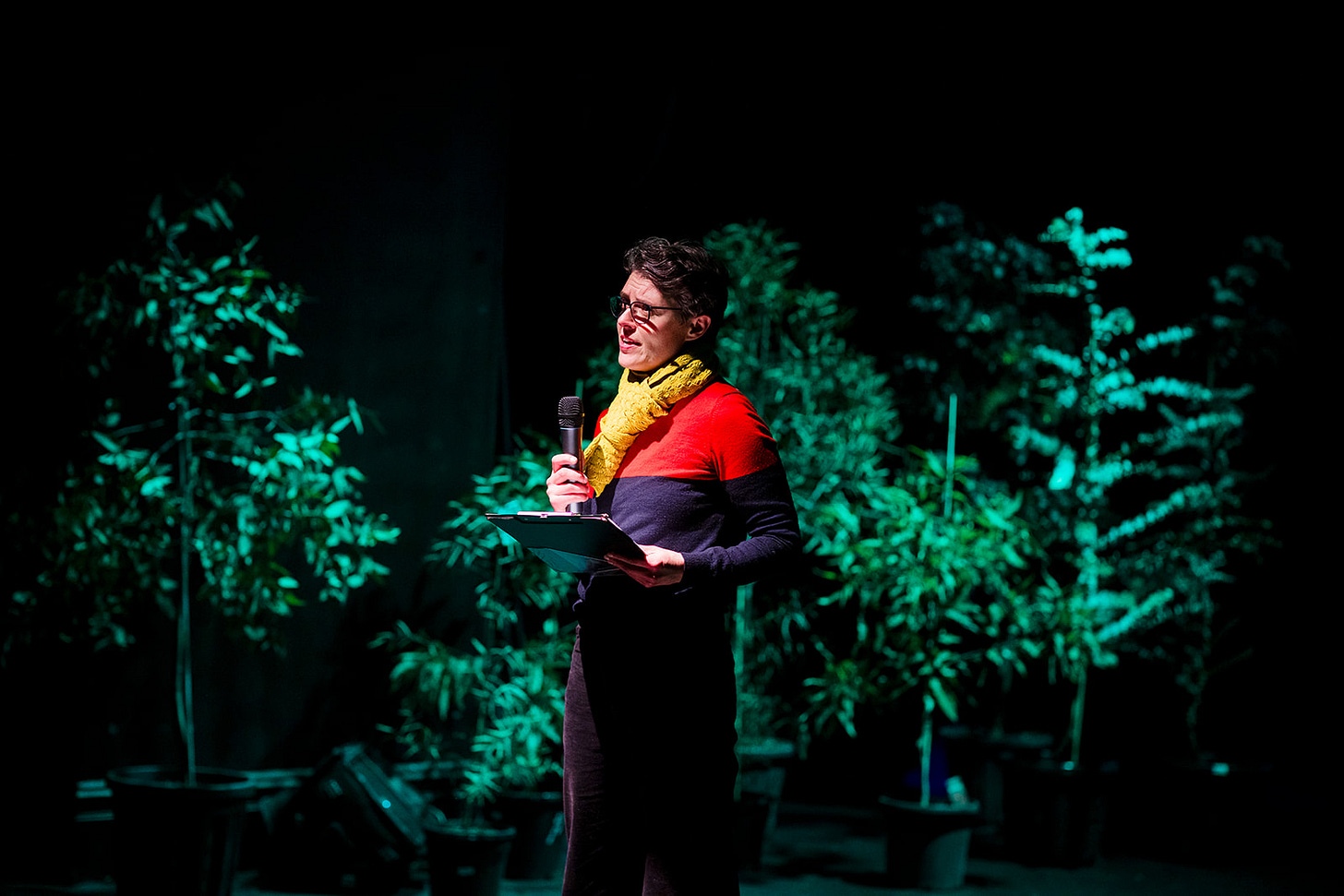Cassia Read | KEYNOTE for Taking Root and Branching Out
Dr Cassia Read is an ecologist, educator, and garden designer living on Djaara Country. Much of her work focuses on designing initiatives and that nurture human wellbeing while conserving biodiversity in the face of a changing climate. She has led many powerful projects including Climate Flags, Wilderhoods and the Plant Selector. Cassia is a Director at the Castlemaine Institute and runs her own practice, Emerging Landscapes and lectures in ecology at La Trobe University.
Cassia generously agreed to give an introduction to the documentary Taking Root in Barkers Creek, which premiered as part of Taking Root and Branching out on August 6, 2025
KEYNOTE for Taking Root and Branching Out
By Cassia Read,
I’m thrilled to be invited to speak tonight. I’m an ecologist and local resident and I’m excited about this event for multiple reasons.
My garden backs onto the frog bogs of Victoria Gully, which connect downstream to Forest Creek which in turn connect upstream to Barkers Creek. In the past I’ve worked with my local restoration group – Friends of Victoria Gully – to create the frog bogs. I’ve also been working with my local neighbourhood, to create habitat for wildlife in our gardens and naturestrips.
Although water, landscape and community connect my local groups with other restoration groups in our region, I’m aware that we all tend to stay within our restoration and landcare silos.
Tonight is important. It’s rare to have so many people under the one roof who are doing the physical and mental hard yakka of caring for this beautiful Djaara Country. It’s a rare opportunity that we come together to eyeball each other and to connect.
And it is rare that we share our stories and our learnings or that we collectively reflect on what is need here and what we have already achieved.
We need this.
Tonight’s offering is rich.
Barkers Creek Landcare made an astute investment in recording their 30-year story that we will hear tonight.
What a valuable resource this audio is for the Barkers Creek Group. Life is always a juggle and our capacity for volunteer work ebbs and flows. People working in the environment space can burn out. People need to be able to come and go. As new members join and old members leave their story won’t be lost. Through this audio, old roots will be known and remembered. New roots will grow more quickly, and the group will continue to thrive and branch out into new own projects.
But the really great thing about this audio, is that now the hard-won lessons of the Barkers Creek group can be shared more broadly through this recording, and our collective knowledge will be deeper and more robust for it.
Tonight’s story is a microcosm of the challenges we face in restoring this particular landscape. Challenges compounded by climate change, people being time-crunched and funding being in short supply. This story is a wellspring of inspiration and a demonstration of what works.
We will also learn tonight about a bold vision for restoration. Barkers Creek Landcare are not just attempting to put indigenous plants in the ground and remove weeds - always a momentous task. And a task that can particularly be dispiriting when we encounter the harsh realities of low planting survival in a degraded landscape, particularly in times of drought.
Barkers Creek are aiming to address the root of this restoration problem – upside down soils, altered topography and hydrology, a landscape that has transformed from being a water absorbent sponge into a gortex shield.
It is critical that we build on this ambitious Barkers Creek project, right across the shire. Growing one resilient habitat patch at a time, we can connect them up and fill our landscape with refuges and corridors.
With more heat, droughts and flash floods to contend with, we will need to be working smarter and harder if we are to help this Country to be resilient through the changes to come.
It’s genuinely heartening to hear about a group like Barkers Creek Landcare who are exploring and experimenting and acting with great wisdom.
Barkers Creek have had the foresight to collaborate with experts to guide their complex work of ecological restoration on a large scale. All Landcare groups will benefit from what they learn.
Barkers Creek have had the insight to foster joyful community moments and friendships. This is what has kept their group alive and kicking for thirty years and this again provides rich learning for all of us.
It was a stroke of genius to invite Kyle Brettle to tell their story. What you will hear tonight is an exquisitely crafted work. Kyla has succeeded in giving voice to a diversity of members, to the threads of history and to the layers of landscape.
In this often foggy and overwhelming time of environmental crisis, this story helps give us all clarity about how to navigate the social and ecological complexity of restoration, to achieve best outcomes for people and nature.
The Barkers Creek story is unique for its cast of characters; it’s setting and the particular narrative. But it is not unique in terms of its themes and purpose. This story is relevant to all of us here in the shire and reminds us of our shared story and our shared hopes for this place.
What a treat it is that we will get to sit quietly together tonight to tune-in and listen deeply. And what a treat it will be to share in a discussion about what’s possible in this community for restoring and healing this beautiful Djaara Country.
Please use this precious time together to learn, to connect, to ferment new energy and to explore new possibilities for the work we can do here, together.

